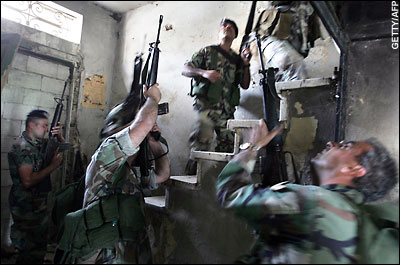|
|
||||
|
|
||||
| Home | Contents | Site Map | Links | Search |

|
|
Heavy shelling leaves a dark plume of smoke over the Palestinian refugee camp. (Daily Telegraph)
|
May 25, 2007 - For the past several days the army shelled the Palestinian refugee camp. On the first day six civilians were killed, including two children, with more deaths to follow. Sixty more were wounded.
Thousands of civilians fled the camp as the shelling continued. Artillery fire disrupted delivery of food and water to the camp, preventing United Nations convoys from getting through. Hidden by darkness, civilians continued their flight, with as many as 10 people packed into one car, flying white flags from their windows. "There are dead and wounded on the road, inside the camp!" one woman screamed."
The 40,000 refugees remaining in the camp had neither food nor water. Homes, mosques, and water tanks were hit. Damage to the infrastructure was extensive.
Oddly, there was no cry of outrage from the United Nations and the international community. No protests or demonstrations from Palestinian advocates around the world. No denunciations by Arab leaders defending their Palestinian brothers and sisters.

|
|
|
Lebanese soldiers launch an assault on Palestinian "militants." (Daily Telegraph)
|
Because this refugee camp is in Lebanon, and the attacking army is Lebanese. In the Middle East Arabs are allowed to kill Arabs without protest, especially when they are fighting "terrorism," and even when there is civilian "collateral damage."
This happened in the Nah al-Bared refugee camp near Tripoli in northern Lebanon. The Lebanese army was going after the Fatah al-Islam group of "militants" who were hiding in that camp.
Were such harsh measures really necessary? Wouldn't it be more enlightened to examine the "root causes" of terrorism, if we really want to stamp it out?
Consider this:
There are about 400,000 Palestinian refugees living in camps scattered throughout Lebanon. They live in poverty and crowded conditions, in a state of apartheid, with fences separating them from the rest of Lebanese society. Lebanese law regards them as foreigners, with none of the privileges of citizenship. The rate of unemployment is as high as 70%, and those who do work perform menial jobs that others shun. "I don't even bother looking for work any more," says one inhabitant of the Rashidieh refugee camp who has a wife and nine children to feed. "They treat us like slaves. I get seven or eight dollars a day at most and it's not enough for food."

|
|
|
Lebanese children react to fleeing the Nahr el-Bared camp. (Daily Telegraph)
|
The children in these camps constitute the third generation of Palestinian refugees. Shaheen Chugtai, a spokesman for Save the Children, says: "When you put people in that kind of situation for a long period of time you find inevitably there is more stress, more violence, more abuse." They are Arabs living as pariahs in an Arab land.
Many people don't know that the number of Jewish refugees from Arab lands is roughly equal to the number of Palestinian refugees. But there are no Jewish refugee camps. In Israel that would be considered shameful. Israel absorbed the Jewish refugees, made them full citizens and gave them their dignity. Only Arab countries have the entitlement to discriminate against their own refugees in perpetuity, and receive sympathy for it.
It's time to examine the root causes of the refugee problem. It's time to consider the real apartheid.
Sources:
Logan, Kitty. "Lebanon Faces New Enemy in Palestinian Camps." Telegraph.co.uk, May 22, 2007.
Logan, Kitty. "Civilians Flee Lebanese Camp After Ceasefire." Telegraph.co.uk, May 23, 2007.
Logan, Kitty. "A Life of Filth for Lebanon Refugees." Telegraph.co.uk, May 23, 2007.
Logan, Kitty. "Thousands Flee Fighting in Lebanon Camp." Telegraph.co.uk, May 23, 2007.
Israeli-Palestinian Conflict:
Peace with Realism